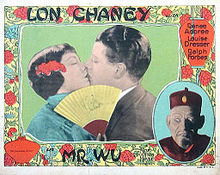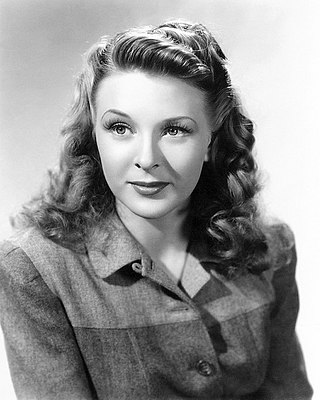
Evelyn Felisa Ankers was a British-American actress who often played variations on the role of the cultured young leading lady in many American horror films during the 1940s, most notably The Wolf Man (1941) opposite Lon Chaney Jr., a frequent screen partner.
Man of a Thousand Faces is a 1957 American dark dramatic film detailing the life of silent film actor Lon Chaney, played by James Cagney.
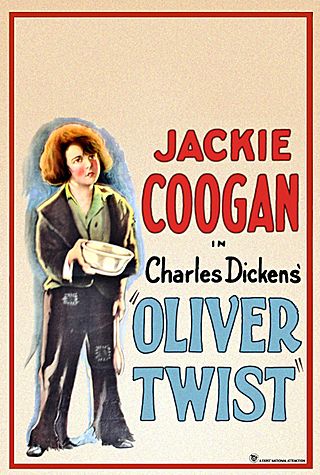
Oliver Twist is a 1922 American silent drama film adaptation of Charles Dickens' 1838 novel Oliver Twist, featuring Lon Chaney as Fagin and Jackie Coogan as Oliver Twist. The film was directed by Frank Lloyd. It was selected as one of the best pictures of 1922 by New York Times, Chicago Tribune and the Los Angeles Times. Walter J. Israel handled the costuming. Studio interiors were filmed at the Robert Brunton Studios in Hollywood. The film's tagline was "8 Great Reels that make you ask for more. Will Hays says Jackie Coogan Films are the sort the World needs." A still exists showing Fagin training his wards to be pickpockets.

Laugh, Clown, Laugh is a 1928 American silent drama film starring Lon Chaney and Loretta Young. The movie was directed by Herbert Brenon and produced by Irving G. Thalberg for MGM Pictures. A sound version of this film was released in the second half of 1928 and featured a synchronized musical score with sound effects. The film was written by Elizabeth Meehan, based on the 1923 Broadway stage production Laugh, Clown, Laugh by David Belasco and Tom Cushing, which in turn was based on the 1919 play Ridi, Pagliaccio by Fausto Maria Martini.

Where East Is East is a 1929 American synchronized sound drama film starring Lon Chaney as an animal trapper in Laos. While the film has no audible dialog, it was released with a synchronized musical score with sound effects using both the sound-on-disc and sound-on-film process. The motion picture is Chaney's penultimate film without dialogue and the last of his collaborations with director Tod Browning. Metro-Goldwyn-Mayer used the Western Electric sound-on-film process to record the soundtrack for the film.

While the City Sleeps is a 1928 American synchronized sound crime drama film about a tough New York City police detective, played by Lon Chaney, out to catch a murdering gangster. While the film has no audible dialog, it was released with a synchronized musical score with sound effects using the sound-on-film Western Electric Sound System process. The film was directed by Jack Conway, written by Andrew Percival Younger, and co-starred Anita Page, Carroll Nye, Wheeler Oakman, and Mae Busch.
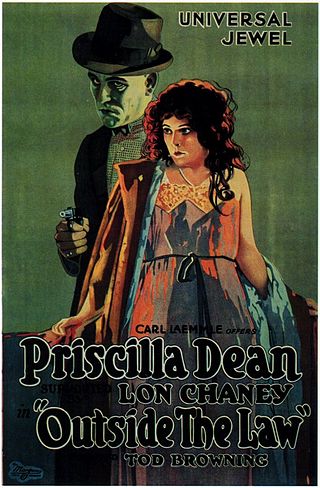
Outside the Law is a 1920 American pre-Code crime film produced, directed and co-written by Tod Browning and starring Priscilla Dean, Lon Chaney and Wheeler Oakman.

The Blackbird is a 1926 American silent crime film directed by Tod Browning and starring Lon Chaney. The screenplay was written by Waldemar Young, based on a story "The Mockingbird" by Tod Browning. Cedric Gibbons and Arnold Gillespie handled the set design. Makeup man Cecil Holland also played one of the old men living at the mission. Character actors Eddie Sturgis and Willie Fung appeared in several other Lon Chaney movies during this time period. The film took 31 days to shoot at a cost of $166,000. The tagline was "Lon Chaney in his successor to The Unholy Three". Stills on the internet shows Chaney in his dual role. In April 2012, the film became available on DVD from the Warner Archive collection.

The Road to Mandalay is a 1926 American silent drama film directed by Tod Browning and starring Lon Chaney, Owen Moore, and Lois Moran. It was written by Elliott Clawson, based on a story idea by Tod Browning and Herman Mankiewicz. The script's original shooting title was Singapore. The film took 28 days to complete at a cost of $209,000. The worldwide box office gross was $724,000. Some stills exist showing Chaney's makeup as Singapore Joe.

Bits of Life is a 1921 American film produced and directed by Marshall Neilan. The cast included Lon Chaney and Noah Beery, Sr. For her performance in this film, Anna May Wong received her first screen credit. It is notable as an early anthology film, comprising four short stories: “The Bad Samaritan” by Thomas McMorrow, “The Man Who Heard Everything” by Walter Trumbull, “Hop” by Hugh Wiley, and “The Intrigue” by Marshall Neilan. The four stories were unrelated, shot with different casts, by different directors, and at different times. The poster called the format "The Magazine Idea brought to the screen". The film's tagline was "The Social World! The Underworld! and San Francisco's Chinatown!".
Maid of the Mist is a 1915 American silent drama film directed by Joe De Grasse, written by James Dayton and featuring Lon Chaney and Pauline Bush. The film is now considered to be lost. The Blake book on Chaney oddly lists Chaney as playing "Jed, the postmaster" in the film, but all other sources claim Chaney played the heroine's father, Lin.
A Mother's Atonement is a 1915 American silent drama film directed by Joe De Grasse, written by Ida May Park, and featuring Lon Chaney and Cleo Madison. Chaney played a dual role as Ben Morrison. Two stills exist showing Lon Chaney in both of the roles he plays in the film.

The Mark of Cain is a 1916 American silent drama film directed by Joe De Grasse, written by Stuart Paton, and starring Lon Chaney and Dorothy Phillips. The film's tagline was "A Thrilling Drama of the Long Arm of the Law With an Absorbing Love Interest". The film's working title was By Fate's Decree.

The Place Beyond the Winds is a 1916 American silent drama film directed by Joe De Grasse, and starring Lon Chaney, Gretchen Lederer and Dorothy Phillips. It was written by Ida May Park, based on the novel by Harriet T. Comstock. The director De Grasse also played a role in the film. The film's original working title was Mansion of Despair. A still exists showing Chaney in the role of Jerry Jo, the homeless man.
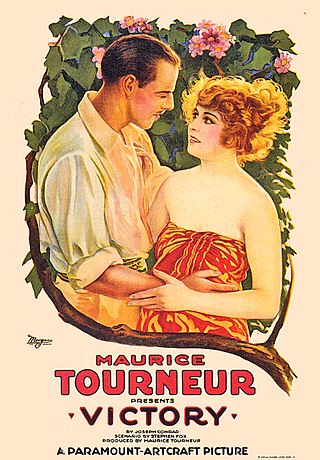
Victory is a surviving 1919 American action film directed by Maurice Tourneur and starring Jack Holt, Seena Owen, Lon Chaney, Wallace Beery and Bull Montana. The film is an adaptation of the 1915 eponymous novel by Joseph Conrad. The screenplay was written by Jules Furthman and Ben Carré was the art director.

Flesh and Blood is a 1922 American silent drama film directed by Irving Cummings and starring Lon Chaney, Noah Beery, Edith Roberts and De Witt Jennings. The film originally had a color flashback scene with Chinese actors, but the color footage is no longer in any of the available prints. The film's working titles were Prison and Fires of Vengeance. Interior scenes were shot at Universal Studios.
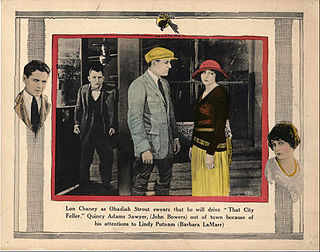
Quincy Adams Sawyer is a 1922 American silent drama film directed by Clarence G. Badger. Distributed by Metro Pictures, the film is written by Bernard McConville, based on the 1900 novel Quincy Adams Sawyer and Mason's Corner Folks, written by Charles Felton Pidgin. The novel had sold over 1.5 million copies at the time, and had had a successful run as a play. Pidgin went on in later years to write two sequels to his novel due to its immense popularity.
Mr. Wu is a 1919 British drama film directed by Maurice Elvey and starring Matheson Lang, Roy Royston, Lillah McCarthy and Meggie Albanesi. It was based on a 1913 play Mr. Wu by Maurice Vernon and Harold Owen. During the filming Albanesi became infatuated with Lang. The picture was made by Stoll Pictures, and was one of their first major successes. Lon Chaney played the title role in a 1927 remake. The screenplay concerns a Chinese Mandarin who murders his daughter.

Louise Jordan Miln was an American actress, writer and novelist.

The Jade Pendant is a 2017 American Western film directed by Leong Po-Chih and starring Godfrey Gao as Tom Wong, Clara Lee as Peony, following a tragic love story leading to the largest mass lynching in American history, of 19 Chinese immigrants in Los Angeles' Chinatown, in 1871.


